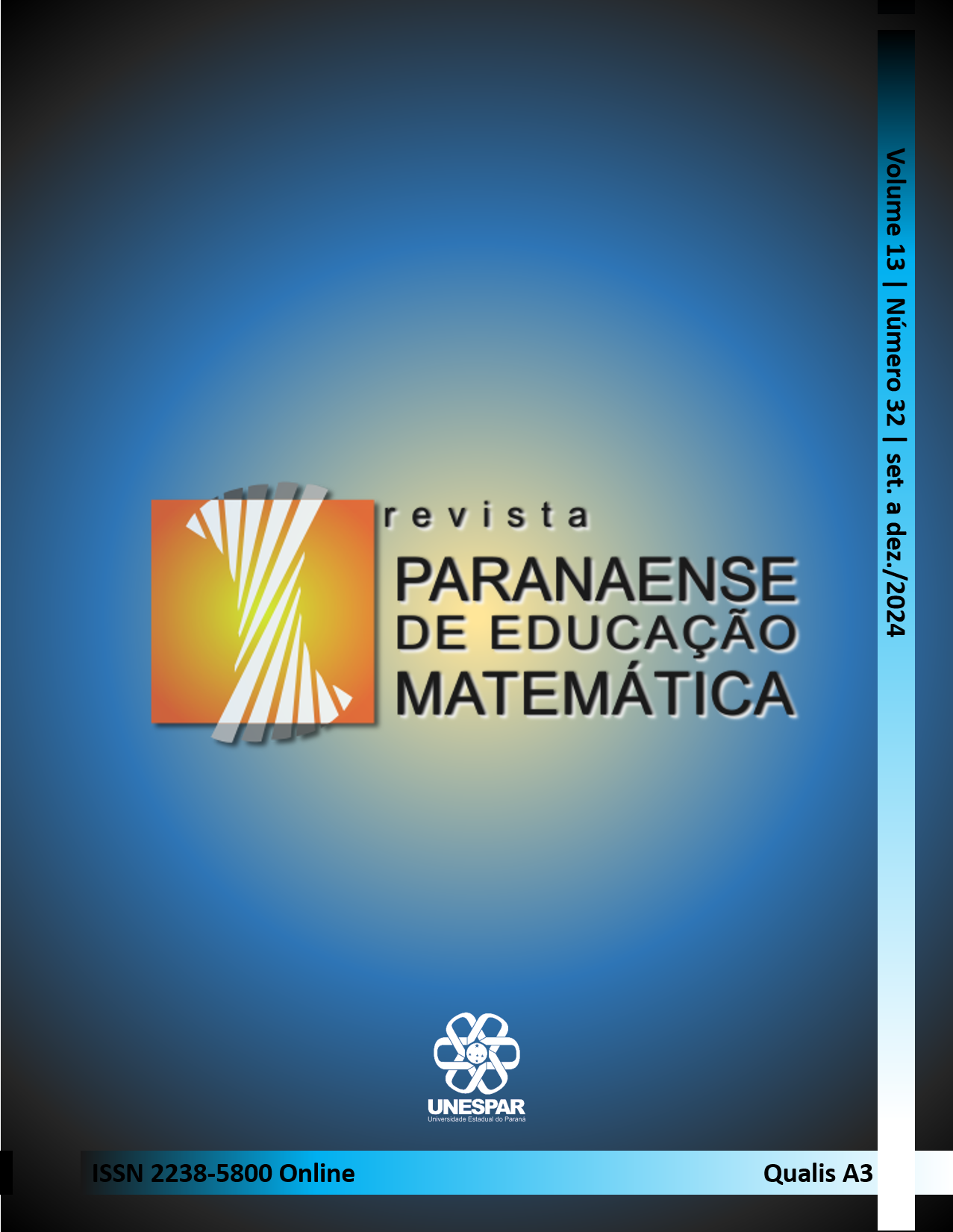O quarteto do conhecimento nas práticas dos Professores que Ensinam Matemática
uma revisão sistemática de literatura
DOI:
https://doi.org/10.33871/rpem.2024.13.32.9633Resumen
O artigo apresenta o desenvolvimento e os resultados de uma revisão sistemática da literatura sobre o modelo teórico do Quarteto do Conhecimento e que teve como objetivo construir um panorama dos estudos voltados para essa temática no período de 2019 até 2023. Para isso, foi feito uma busca em bases de dados nacionais e internacionais, nas quais foram encontrados 24 artigos para serem analisados a partir de cinco questões norteadoras voltadas para o local de publicação, o tipo de pesquisa, o ambiente aplicado, os instrumentos utilizados e as ampliações propostas para o Quarteto do Conhecimento. Os resultados evidenciam que há um número reduzido de artigos direcionados para essa temática no cenário acadêmico mundial. Nesses últimos cinco anos foram encontrados apenas três artigos publicados no Brasil, um com características de pesquisa bibliográfica e dois com aspectos de uma pesquisa naturalista ou de campo que exploraram as salas de aula dos anos finais do Ensino Fundamental e do Ensino Médio. De acordo com as produções investigadas, o modelo teórico do Quarteto do Conhecimento é relativamente novo e está sujeito às adequações a partir da inclusão de novos códigos contributivos e até de uma nova dimensão.
Descargas
Citas
BENITEZ, R. A.; SANTIBANEZ, M. U. Reflexiones de futuros profesores en relación con situaciones contingentes en la sala de clases. Educación matemática, Ciudad de México, v. 32, n. 3, p. 178-208, 2020. https://doi.org/10.24844/em3203.07
CAICE, C. A. T.; SANDOVAL, H. P.; GONZÁLEZ, M. D. Procesos de enseñanza de la función exponencial. Un acercamiento cualitativo. Revista Científica UISRAEL, [S. l.], v. 7, n. 3, p. 37–50, 2020. https://doi.org/10.35290/rcui.v7n3.2020.303
COSKUN, S. D.; BOSTAN, M. I. Comparison of Pre-service Elementary Teachers’ Mathematical Knowledge in Teaching for Length Measurement: Turkey and the United States. Pedagogical Research, [s.l.], v. 7, n. 1, 2022.
COSKUN, S. D.; BOSTAN, M. I.; ROWLAND, T. Surprises in the mathematics classroom: Some in-themoment responses of a primary teacher. Mathematics Teacher Education and Development, Turkey, v. 23, n.1, p. 91-112, 2021.
DAHL, H.; ENGE, O.; HANSEN, T. H.; VALENTA, A. Lesson plays as a mirror on prospective teachers’ professional knowledge for mathematics teaching. Mathematics Teacher Education and Development, Australia, v. 21, n. 1, p. 82-99, 2019.
FERREIRA, N. S. D. A. As Pesquisas denominadas "Estado da Arte". Educação & Sociedade, Campinas, v. XXIII, n. 79, 2002.
FIORENTINI, D.; LORENZATO, S. Investigação em Educação Matemática: percursos teóricos e metodológicos. Campinas: Autores Associados, 2006.
FUERTES, R.; ALBARRACÍN, L. Un estudio exploratorio sobre el conocimiento del maestro para guiar actividades de modelización matemática en Educación Primaria. Modelling in Science Education and Learning, Universitat Politècnica de València, v. 12, n. 2, 2019. https://doi.org/10.4995/msel.2019.10977
GETENET, S., CALLINGHAM, R. Teaching Interrelated Concepts of Fraction for Understanding and Teacher’s Pedagogical Content Knowledge. Mathematics Education Research Journal, [s.l.], n. 33, p. 201–221, 2021. https://doi.org/10.1007/s13394-019-00275-0
GETENET, S.; FIELDING, J.; HAY, I.; CALLINGHAM, R. Describing a teacher’s pedagogical mathematical knowledge in STEM teaching. Mathematics Education Research Journal, 2023. https://doi.org/10.1007/s13394-023-00480-y
GUMIERO, B. S.; PAZUCH, V. Knowledge Quartet: dimensões, pesquisas e reflexões sobre o conhecimento profissional do professor que ensina matemática. Bolema: Boletim de Educação Matemática, v.34, n.66, 2020, p. 268-293. https://doi.org/10.1590/1980-4415v34n66a13
GUMIERO, B. S.; PAZUCH, V. Teachers Knowledge Mobilized in Geometry Lessons and Contingency Situations. International Electronic Journal of Mathematics Education, London, v. 16, n. 1, 2021a.
GUMIERO, B. S.; PAZUCH, V. O Planejamento de Tarefas de Geometria e a Mobilização do Conhecimento Profissional Docente. Ciência & Tecnologia, Bauru – SP, v. 27, p. 1-16, 2021b. https://doi.org/10.1590/1516-731320210025
LAI, Y.; LISCHKA, A. E.; STRAYER, J, F.; ADAMOAH, K. Characterizing prospective secondary teachers’ foundation and contingency knowledge for definitions of transformations. The Journal of Mathematical Behavior, [s.l.], v. 70, p. 1-177, 2023. https://doi.org/10.1016/j.jmathb.2022.101030
LANE, C.; O'MEARA, N.; WALSH, R. Pre-service mathematics teachers' use of the mathematics register. Issues in Educational Research, Australia, v. 29, n.3, p.790-806, 2019.
MAHER, N.; MUIR, T.; CHICK, H. Analysing senior secondary mathematics teaching usingthe Knowledge Quartet. Educational Studies in Mathematics, [s.l.], v. 110, n. 2, p. 233–249, 2022. https://doi.org/10.1007/s10649-021-10125-1
MOODLIAR, J.; GOPAL, D. Failing to capitalise on contingente events: an investigation into a secondary mathematics teacher’s responses to triggers of contingency during the teaching of Algebra. Africa Education Review, [s.l.], v.18, n. 5-6, p. 91-112, 2023. https://doi.org/10.1080/18146627.2022.2157742
MPALAMI, N.; MOLEKO, M. M. A critical exploration of student teacher’s choice and use of representations in a challenging environment. Eurasia Journal of Mathematics, Science and Technology Education, [s.l.], v. 18, n. 11, 2022. https://doi.org/10.29333/ejmste/12516
OATES, G.; CALLINGHAM, R.; GETENET, S.; HAY, I.; BESWICK, K.; THOMAS, D. Technology and the Knowledge Quartet. Proceedings of the 42nd annual conference of the Mathematics Education Research Group of Australasia, Australia, 30 June – 4 July, p. 532-539, 2019.
O'KEEFFE, L.; WHITE, B. Supporting mathematics pre-service teachers reflection with 360degree video and the Knowledge Quartet. Australian Journal of Teacher Education, [s.l.], v. 47, n.3, 2022. https://doi.org/10.14221/ajte.2022v47n3.4
PÉREZ, A. DE. LA F.; PIQUET, J. D. Uso de las conexiones entre representaciones por parte del profesor en la construcción del lenguaje algebraico. Bolema, Rio Claro - SP, v. 36, n. 72, p. 389-410, abr. 2022. https://doi.org/10.1590/1980-4415v36n72a17
ROWLAND, T. The knowledge quartet: the genesis and application of a framework for analysing mathematics teaching and deepening teachers’ mathematics knowledge. SISYPHUS. journal of education. v.1, issue 3, 2013, p. 15-43. https://doi.org/10.25749/sis.3705
ROWLAND, T.; HUCKSTEP, P.; THWAITES, A. Elementary teachers’ mathematics Subject knowledge: the Knowledge Quartet and the case of Naomi. Journal of Mathematics Teacher Education, [s.l.], v. 8, n. 3, p.255-281, 2005. https://doi.org/10.1007/s10857-005-0853-5
SALANI, E.; JOJO, Z. The Pedagogical manifestations: A driver of teachers’ practices in teaching Algebraico equations. European Journal of Educational Research, [s.l.], v. 12, n. 1, p. 15-28, 2023. http://dx.doi.org/10.12973/eu-jer.12.1.15
SHULMAN, L. Knowledge and teaching: foundations of the new reform. Harvard Educational Review, Cambridge, US, v. 57, n. 1, p. 1-22, 1987.
SHULMAN, L. Those who understand: knowledge growth in teaching.
Educational Researcher, Washington, US, v. 15, n. 2, p. 4-14, 1986.
SILVA, F.; PAZUCH, V. Conhecimentos geométricos mobilizados na prática do professor: knowledge quartet como ferramenta de análise. Revista Latinoamericana de Investigación en Matemática Educativa, [s.l.], v. 26, n.1, p. 47-80, 2023. https://doi.org/10.12802/relime.23.2612
TURGUT, M.; TANISLI, D.; KÖSE, N. A mathematics teacher educator’s feedback affecting teachers’ design of hypothetical learning trajectories for teaching patterns. International Journal for Mathematics Teaching and Learning, United Kingdom, v. 22, n. 2, p. 33-54, 2021. http://dx.doi.org/10.4256/ijmtl.v22i2.382
UNVER, S. K.; GUZEL, E. B. Prospective mathematics teachers’ choice and use of representations in teaching limit concept. International Journal of Research in Education and Science, Turkey, v. 5, n. 1, p. 134-156, 2019.
VETTEN, A.; KEIJZER, R.; SCHOONENBOOM, J.; OERS, B. V. Pre-service primary school teachers’ knowledge during informal statistical inference. Statistics Education Research Journal, [s.l.], v. 22, n. 2, p. 639–661, 2019. https://doi.org/10.1007/s10857-018-9403-9
XIAO, Y.; WATSON, M. Guidance in Conducting a Systematic Literature Review. Journal of Planning Education and Research, v.39, p.93-112, 2019. https://doi.org/10.1177/0739456X17723971
Descargas
Publicado
Cómo citar
Número
Sección
Licencia
Derechos de autor 2024 Revista Paranaense de Educação Matemática

Esta obra está bajo una licencia internacional Creative Commons Atribución-NoComercial-SinDerivadas 4.0.










